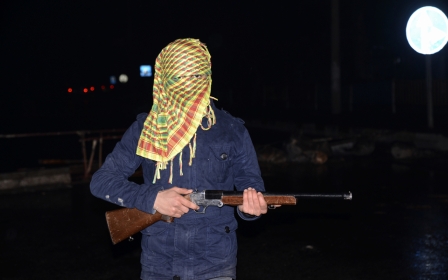Covering Turkey: Politics makes strange bedfellows

After Fethullah Gulen, a cult leader charged with attempting to overthrow the democratically elected Turkish government, a PYD militant also wrote an op-ed for the New York Times. Ignoring the fact that the PYD is the same organisation as the PKK - which is designated as a "terrorist" organisation both by the US and the EU - Turkish officials have explained this many, many times.
But the US administration turned a blind eye to the PYD’s strong ties with the PKK, as well as to the PYD’s war crimes, and recognised it as a "reliable partner". Even Iraqi Kurdistan’s leader Massoud Barzani said that the PKK and the PYD are the same, but the US chose not to listen to him either.
The bomber who carried out the most recent suicide attack in Ankara, Seher Cagla Demir, went to Kobane and trained there for five months with YPG units before becoming a suicide bomber and killing 37 people. She could just as easily have been an op-ed writer for the New York Times since the NYT allowed a PYD militant to write for it. That apparently not being sufficient, PYD co-leader Salih Muslim also was given the opportunity to write for the New York Times.
Then the NYT took its support for the PKK-PYD one step further and a pro-PKK reporter showed up in the NYT’s pages: Safak Timur. Timur works for IMC-TV as a news anchor. IMC TV’s coverage is just as much pro-PKK propaganda as the PKK’s official media organs. Some Turkish-language news sites simply refer to IMC TV as "the PKK’s channel". She is obviously a great choice for reflecting Turkey objectively, right?
Most recently, the NYT gave an op-ed turn to Selahattin Demirtas, co-leader of the HDP, which is generally understood to be the PKK’s political wing. Demirtas said in his article that: "While the American public is right to be concerned about Mr Erdogan’s efforts to stifle free speech and imprison journalists, as a Kurd I am saddened that the criticism ends there. There has been hardly any real mention of the government’s abuses in the fight against the Kurdistan Workers’ Party, or PKK, the deportations of civilians, the destruction of Kurdish towns and the imprisonment of Kurdish politicians in Turkey."
This is clearly inaccurate. Just like Demirtas, as a Kurd I am also saddened but for a different reason, which is that there has been hardly any mention of how the PKK dug trenches and erected barricades in predominantly Kurdish cities and towns, used civilian Kurds as human shields against the Turkish state, and recruited children to fight for them. CNN even managed to publish a full report from the southeast of Turkey without mentioning the PKK once.
On the other hand, there are so many stories in the US media whitewashing the PKK and claiming that Erdogan is oppressing the Kurds. Well, even though his article is about Erdogan’s repression, he still claims that there are not enough articles about the Turkish government’s supposed human rights abuses.
Demirtas does not follow the international media enough clearly. Because if he did, he would’ve seen that the international media reports are very satisfying for him. Despite what Demirtas maintains, that the Turkish government deported civilians, the Turkish government in actuality booked hotels in Diyarbakır and placed Sur district citizens who fled from their homes because of the PKK’s actions in those hotels.
In addition, it is obvious that Kurdish towns were mostly destroyed by the PKK since they even burned the oldest Ottoman-era mosque, Kursunlu Mosque, in the Sur district and used churches and houses as military bases. The Turkish government has promised to restore every single historical site and construct new houses as soon as possible after the conflict is resolved.
Moreover, Demirtas claims in his article, "Both Europe and the United States have turned a blind eye to the human rights violations in Turkey’s Kurdish towns over the past year." Yet recently the European Parliament released a report that criticises Turkey’s record on human rights. In parallel, the US State Department’s annual human rights report also accuses Turkey of restricting civil rights and violating basic human rights. So, Demirtas is wrong about that, too.
He continues his article by stating that, "Ever since peace talks between the Turkish government and the PKK broke down last summer, the country has been in havoc." However, the peace process did not break down just by itself. In reality, the PKK unilaterally ended the ceasefire and resumed armed struggle in summer 2015. The PKK’s umbrella organisation, the KCK, announced an end to a two-and-a-half-year-long ceasefire with the government on 11 July. Demirtas initially writes as if the peace talks broke down just by itself, so let’s say that he is trying to be neutral in the conflict between the Turkish state and the PKK.
But later on his real thoughts come out, and he says in his article that, "Mr Erdogan presented himself as 'fighting terrorism' and complained that the United States hasn’t supported his campaign against the Kurds in Syria and Turkey" by ending the peace process with the PKK. In actuality, the KCK declared the end of the peace process, and after that the PKK killed a Turkish soldier on 21 July 2015 and murdered two sleeping Turkish police officers on 22 July 2015. Demirtas does not tell the truth there, either.
He adds that "Last August, Kurdish youth groups close to the PKK began an insurgency in some Kurdish towns." It’s not just an "insurgency" of course. The PKK’s youth wing is armed, mostly trained in Kobane and Kandil with the PKK and PYD units, and dug trenches and erected barricades for autonomy, which Demirtas himself also supported.
Demirtas also implies that Erdogan targets the HDP for advocating Kurdish rights, but he forgets that progress towards equal citizenship rights for Kurds was achieved far more in the AK Party era than in any other period since the foundation of the Turkish Republic. Also, almost half of the Kurdish population of Turkey votes for the AK Party. This is also a fact that neither the international media nor Demirtas want to admit to their readers.
Consequently, every day the NYT tries to make its Turkey coverage even more pro-HDP/PKK/PYD. Demirtas or his ideology can be a useful tool for the US government for now, but let’s take a closer look at Demirtas’s real thoughts about the US. He always said that as a leftist, he is against US imperialism. In fact, he once said that he is against the US’s imperialist political agenda in Syria.
Actually, it is clear that this political agenda makes the PYD strong in Syria. He also claims that the US sent weapons to the Free Syrian Army and that Al-Nusra Front received them in the end. Demirtas even went on the Hezbollah-affiliated television network, Al-Manar, and applauded Hezbollah’s efforts in the interview and said that he stands with their resistance.
The NYT prefers to become the international mouthpiece for cult leaders attempting a coup, or for terrorist organisations with a Stalinist ideology like the PKK and the PYD, and to use them to attack the US’s NATO ally Turkey. This entire situation quickly brings to mind the old saying "politics does make strange bedfellows" to mind.
- Beybin Somuk is a reporter for the Turkish news show Şimdi ve Burada. She studied law at Yeditepe University, Istanbul. You can follow her on Twitter @beybinn. This article originally appeared in the website TheKebabAndCamel.com.
The views expressed in this article belong to the author and do not necessarily reflect the editorial policy of Middle East Eye.
Photo: A stage with a giant screen displaying the image of jailed leader of the Kurdistan Workers Party (PKK) Abdullah Ocalan, a Turkish flag, and the logo of the Peoples’ Democratic Party (HDP, during the second general assembly of the party at Ahmet Taner Kislali Sports Hall in Ankara on 24 January, 2016 (AFP).
Stay informed with MEE's newsletters
Sign up to get the latest alerts, insights and analysis, starting with Turkey Unpacked
Middle East Eye delivers independent and unrivalled coverage and analysis of the Middle East, North Africa and beyond. To learn more about republishing this content and the associated fees, please fill out this form. More about MEE can be found here.





